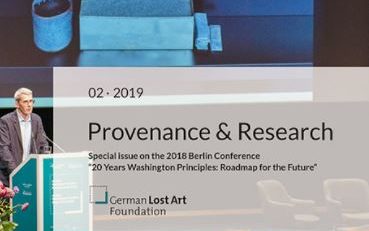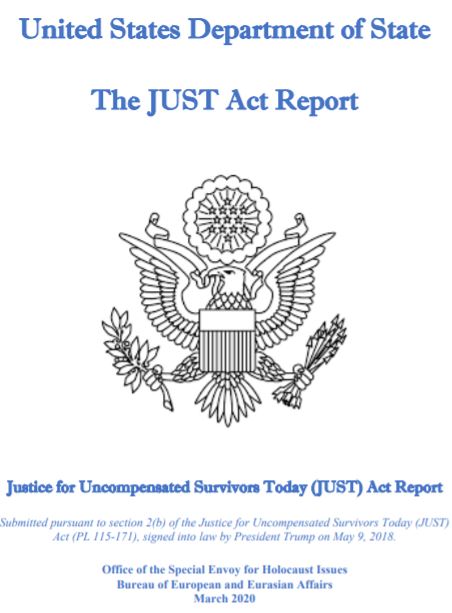In 2014, the Claims Conference-WJRO published the report “Holocaust-Era Looted Art: An Overview of Worldwide Progress“. The report on 50 countries showed that two thirds of the countries that have endorsed international agreements regarding research, publicity and claims for Nazi-era looted art have done little or nothing to implement pacts.
Five years earlier, in 2009, the Claims Conference-WJRO, along with 47 nations, convened for the Prague Conference on Holocaust Era Assets. On that ocassion the Claims Conference-WJRO submitted the report “Holocaust Era Looted Art: A World-Wide Preliminary Overview, Prepared by the Claims Conference and the WJRO,” recommending actions to address the challenges of Nazi-era looted art.
In 2006 the Claims Conference-WJRO conducted a survey of U.S. Museums concerning adherence to the Washington Conference Principles on Nazi-Confiscated Art and the procedures and guidelines recommended by the American Association of Museums regarding objects transferred in Europe during the Nazi era.
Work with Individual Countries
Canada | Croatia | Czech Republic | Germany | Israel | Netherlands | Poland | Serbia | Switzerland | United States | European Union | EHRI | IHRA | Association of Jewish Museums | Calling for Public Attention
The Claims Conference-WJRO works with governments and relevant Jewish communities in various countries to try to ensure a just, fair and simple process for claims for looted art and other cultural property in each country. Examples of past activities include:
Canada
Encouraged by the Claims Conference-WJRO, the Department of Canadian Heritage of the Government of Canada contracted with the Canadian Art Museum Directors’ Organization (CAMDO) to perform a survey of the state of provenance research in the country’s museums.
Croatia
The Claims Conference-WJRO has held discussions with the Ministry of Culture of Croatia regarding the need for provenance research on collections in the country. The Claims Conference/WJRO has undertaken to work with the National Library of Israel to catalog and identify all Hebrew and other Jewish-language books and manuscripts known to have been looted that are in Croatia, which lacks sufficient expertise in cataloging in those languages to be able to identify what the country has. As of late spring 2017, the National Library of Israel (NLI) completed its work, having examined 6800 items for which the Jewish Community of Zagreb provided scanned images of the title and other relevant pages. For more information, see “Identification and cataloging of Hebrew and other Jewish books and manuscripts looted during the Holocaust that are now in the collection of the Jewish Community of Zagreb.”
Czech Republic
In cooperation with the Federation of Jewish Communities of the Czech Republic, the Claims Conference-WJRO convinced the Czech Parliament to cancel a deadline for the return by the government of plundered artworks.
Germany
In March 2012, German authorities discovered artworks, many of which are suspected of having been looted by the Nazis, in the apartment of Cornelius Gurlitt, the son of Nazi-associated art dealer Hildebrand Gurlitt. However, the discovery was not made public until a German magazine broke the story in November 2013.
Shortly afterwards, more artworks were discovered in an Austrian home of Mr. Gurlitt as well, bringing the total number of artworks in his possession to approximately 1,600.
The Claims Conference immediately led the public campaign for all the discovered works, including additional ones in Austria, to be made public and researched expeditiously in order to facilitate restitution of the works in the collection that had been taken from Jews. The Claims Conference also announced that it believed that numerous works in the collection are in its online database of art objects looted in France and Belgium. Finally, the Claims Conference demanded, and received, two appointments to the task force assembled by German authorities that was researching the provenance of the works. Since 1 January 2016, the German Lost Art Foundation is heading the Gurlitt Provenance Research project. In September 2020, the Claims Conference finished its review of the Gurlitt Provenance Research project findings.
In late 2016, the Claims Conference successfully advocated for the inclusion of Jewish members in the “Advisory Commission on the Return of Cultural Property Seized as a Result of Nazi Persecution, Especially Jewish Property (Limbach Commission).” The Claims Conference continues to press other changes in the Commission’s operations. For more information, see: Germany.
The Claims Conference is speaking to the German government about the need for broader provenance research, legislation changes, and establishment of an international commission concerning the large amount of looted cultural property that remains in German state institutions. In response, Germany has established the German Center of Cultural Property – German Lost Art Foundation.
As of 2020, the German Lost Art Foundation has added a Help Desk for those seeking to reclaim Nazi-Looted Art, partially at the recommendation of the Claims Conference.

In June 2020 an English translation of the German Lost Art Foundation’s issue of its periodical “Provenance & Research” on the international conference “20 Years Washington Principles: Roadmap for the Future” held in 2019 was published with an article by Wesley Fisher reiterating the Claims Conference/WJRO policy on cultural property.
Also in 2020, the Claims Conference reviewed the results of the Gurlitt Provenance Research posted online and believes that 232 cases of the 385 cases categorized as “yellow” should be reviewed again.
Israel
The Claims Conference-WJRO has worked with Hashava – the Holocaust Restitution Company of Israel to improve provenance research in Israeli museums and libraries. Please note that Hashava ceased its activities by law on December 31, 2017. Efforts are continued under the Ministry of Culture.
In June 2014, the Claims Conference-WJRO helped to organize the Hashava International Forum on Holocaust Era Cultural Assets in Israel. A second conference was held in June 2015.
The Claims Conference-WJRO is working with the National Library of Israel to catalog and identify all Hebrew and other Jewish-language books and manuscripts known to have been looted that are in countries without sufficient expertise in cataloging in those languages to be able to identify what they have. See also “Identification and cataloging of Hebrew and other Jewish books and manuscripts looted during the Holocaust that are now in the collection of the Jewish Community of Zagreb.”
Netherlands
In cooperation with the Central Jewish Board (CJO) of the Netherlands, the Claims Conference-WJRO convinced the Ministry of Education, Culture, and Science of the Netherlands to extend indefinitely claims for objects in the Netherlands Art Property Collection (NK Collection).
The Claims Conference-WJRO participated in the review of restitution policies and assisted in the writing of the report “Striving for Justice“. The 2020 report argues that provenance research should be carried out again and that a new and unambiguous framework should be put in place to handle restitution applications for artworks looted by the Nazis.
Poland
The Claims Conference-WJRO has publicly advocated the need for Poland to review not only those cultural items that were taken from Poland but also those objects that are in the collections of Poland’s museums and libraries. Assistance has also been given to the return by Poland to Greece of the Greek Jewish collections held in Warsaw.
The Claims Conference-WJRO sponsored research work by Dr. Patricia Kennedy Grimsted for her major article entitled “A Goudstikker van Goyen in Gdańsk: A Case Study of Nazi-Looted Art in Poland” now published in the International Journal of Cultural Property, Volume 27, 2020, Number 1.
Serbia
In cooperation with the Federation of Jewish Communities in Serbia, the Claims Conference-WJRO worked with the Serbian government on drafting a law passed in 2016 regarding heirless property that also covers communal and individual cultural property. Recommendations of the Claims Conference-WJRO have been published in Serbia in an article entitled “Restitution of Art, Judaica, and Other Cultural Property Plundered in Serbia During World War II.”
Switzerland
The Swiss Federal Office of Culture, encouraged by the Claims Conference-WJRO, conducted a survey on the state of provenance research in 551 Swiss museums and encouraged the cantonal and community museums, as well as federation museums, to examine their collections.
The Claims Conference was in discussion with the Kunstmuseum Bern in regard to its Gurlitt inheritance and its anticipated commission for provenance research.
United States
The Claims Conference helped support the Nazi-Era Provenance Internet Portal (NEPIP), a searchable online registry of objects in American museum collections that changed hands in Continental Europe during the Nazi era (1933-1945). As of October 2020, 179 museums are participating in the database, which is maintained by the American Alliance of Museums (AAM).
The Claims Conference-WJRO has surveyed U.S. Museums regarding their adherence to the Washington Conference Principles on Nazi-Confiscated Art and the Guidelines of the American Alliance of Museums, and has voiced concern over the reluctance of the AAM to use its accreditation of museums to enforce adherence to its Guidelines. See section on U.S. Museum Survey.
In December 2016, President Barack Obama signed into law the Holocaust Expropriated Art Recovery (HEAR) Act to aid recovery of Nazi-looted art. Ambassador Ronald S. Lauder, Chairman of the Council of the World Jewish Restitution Organization (WJRO), who is also Chairman of the Commission for Art Recovery (CAR) as well as President of the World Jewish Congress, praised Obama and Congress for delivering overdue justice to Holocaust victims and their families. The World Jewish Restitution Organization (WJRO), through the Report Concerning Approaches of United States Museums to Holocaust-Era Art Claims it issued in 2015 as well as advocacy over the years by the Conference on Jewish Material Claims Against Germany (Claims Conference) and the WJRO played an important role in this effort.

The JUST Act was introduced in the Senate by Sen. Tammy Baldwin (D-Wis.) and Sen. Marco Rubio (R-Fla.), and in the House of Representatives by Rep. Joseph Crowley (D-N.Y.) and Rep. Chris Smith (R-N.J.). The 2018 bill requires the State Department to investigate and submit a report to Congress on the extent to which endorsees of the 2009 Terezin Declaration on Holocaust Era Assets and Related Issues are meeting their pledges to adopt national laws and policies to help Holocaust survivors identify and reclaim their properties.
In March 2020, the Just Act Report was released by the Office of the Special Envoy for Holocaust Issues Bureau of European and Eurasian Affairs.
European Union
In September 2015, the “Provenance Research and Cultural Heritage” exhibition was presented by the European Shoah Legacy Institute (ESLI) at the European Parliament in connection with ESLI efforts in cooperation with the EU Committee on Legal Affairs to introduce a legislative initiative into the European Parliament, with the predominant aim of promoting provenance research and combating the trafficking of plundered cultural heritage.
On January 17, 2019, the European Parliament as a whole passed a resolution on cross-border restitution claims of works of art and cultural goods looted in armed conflicts and wars. The Claims Conference-WJRO was helpful in the preparation of this resolution, and both the EU Parliament report and resolution cited the Claims Conference-WJRO.
Together with the Claims Conference and the Commission for Art Recovery, the European Union co-funds the Jewish Digital Cultural Recovery Project.
Work with Associations of Jewish Museums and Libraries
The Claims Conference-WJRO has worked with the Association of European Jewish Museums (AEJM), the Council of American Jewish Museums (CAJM), and the Association of Jewish Libraries (AJL) to ensure that Jewish museums, archives, and libraries fully participate in provenance research and restitution efforts and to ensure that there is proper training for those who will conduct provenance research.
All three associations made declarations in this area:
AEJM Resolution
CAJM Resolution
AJL Resolution
Calling Public Attention to Issues of Looted Art
The Claims Conference supported the film Chasing Portraits by Elizabeth Rynecki.
The Claims Conference helps support exhibitions related to looted art, such as “Reclaimed: Paintings from the Collection of Jacques Goudstikker,” presented by the Jewish Museum of New York, and the “Auktion 392” touring exhibition presented by the Ben Uri Gallery at the London Jewish Museum of Art.
last updated February 2024
